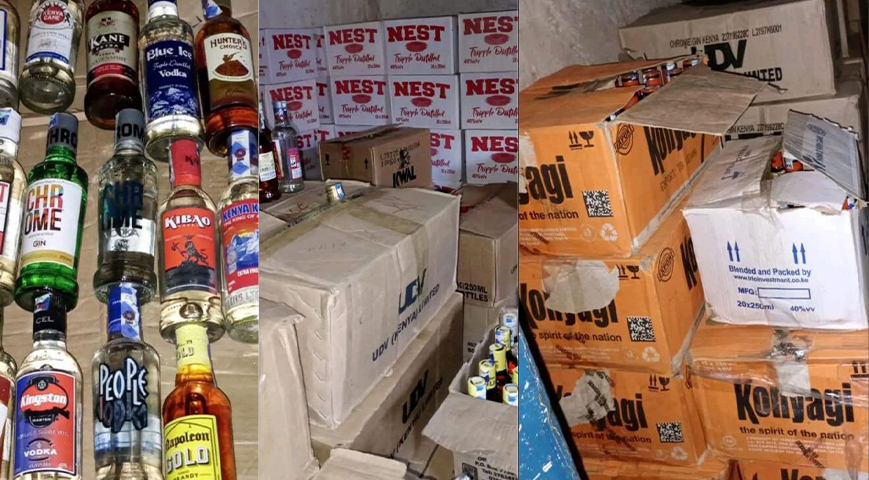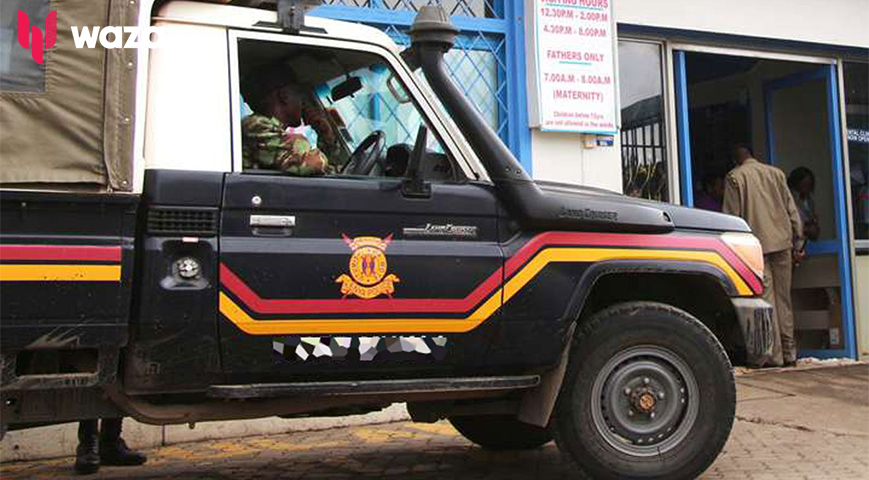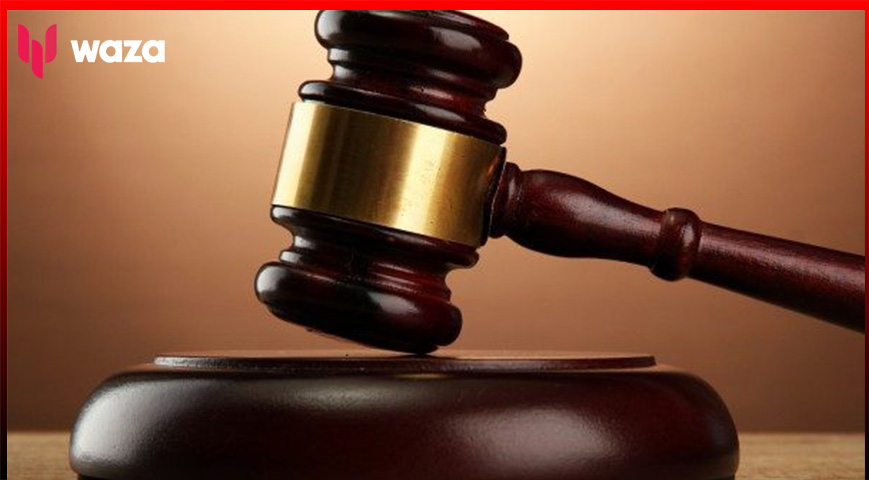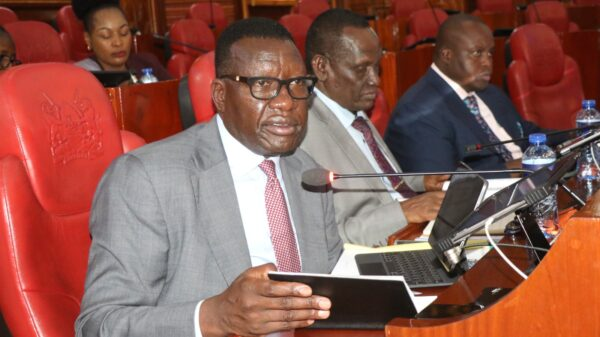The government has unveiled fresh, comprehensive initiatives to end drug use, illegal brewing, and substance abuse nationwide.
This comes after all Regional and County National Government Administration Officers (NGAO) and Security Teams, including County Police Commanders from the Kenya Police Service, Administration Police Service, and Directorate of Criminal Investigations, met at the invitation of Deputy President Rigathi Gachagua.
Following the meeting at the DP's official residence in Karen, Nairobi, Interior Cabinet Secretary Kithure Kindiki read out a statement in which the government characterized the current state of drug and alcohol abuse and trade as a national security threat, citing high levels of consumption and trade.
"As previously indicated, the trade, consumption, and abuse of illicit alcohol, narcotics drugs and psychotropic substances now ranks as one of the five key national security threats, that include terrorism, banditry and livestock rustling, cultural, religious and political extremism, and climate change," reads the statement in part.
To address the issue of illicit alcohol consumption and substance abuse in the nation, the government has declared plans to implement the following policies:
Did you read this?

1. Effective immediately, all licenses and certification permits issued by the Kenya Revenue Authority (KRA) and Kenya Bureau of Standards (KEBS) to manufacturers and distillers of second-generation alcohol and alcoholic beverages are suspended. Within 21 days of this directive, all currently valid licenses will be reexamined, and the premises will only be permitted to reopen for business after receiving new approval.
2. The Ministry of Interior and National Administration is inviting all presently licensed manufacturers and distillers to a meeting on the aforementioned prescription on Tuesday, March 12, 2024, at 10:00 a.m. Separate covers will be used to send out due notifications.
3. Manufacturers must have quality control (QC) laboratories equipped with gas chromatography with a flame ionization detector (FID) to test incoming raw materials and completed goods before releasing them onto the market. These laboratories must be operated by competent laboratory analysts. This requirement applies to new license applications. The laboratories should sign up with an interlaboratory comparison service provider and send the Kenya Bureau of Standards (KEBS) their monthly quality control results.
4. From now on, all alcohol producers must identify and register every dealer in their supply network and have policies to guarantee complete traceability of alcoholic beverages made for retail sales from the manufacturer to the end user. Traceability information, such as manufacturer details, location, and ingredients/content, must be included with all alcoholic products.

5. To avoid diversion and the unintentional use of industrial ethanol in alcohol production, the Kenya Bureau of Standards shall guarantee that all industrial ethanol is denatured or marked with a denaturing agent (denatonium benzoate) within 45 days.
6. All current County Government licenses to bars and other establishments that violate the Alcoholic Drinks Control Act's provisions—particularly those about licensing establishments in residential areas and near elementary schools—are void. With immediate effect, County Security Teams must ensure the closure and confiscation of said properties.
7. According to section 34 of the Alcoholic Drinks Control Act, no bars or other alcohol-related establishments may stay open later than the hours listed for operation. If this is done, the operator faces legal penalties, including fines and jail time, and all alcohol-related accessories and drinks on the property are forfeited along with the license.

8. Manufacturers and distillers aware of product counterfeiting but choose not to notify the Anti Counterfeit Authority about it risk being found complicit. Licensed manufacturers will have to provide County Security Teams with stock records for each licensed premises and the physical location and geolocation of their licensed premises. Any other physical location that manufactures, stocks, or stores manufactured goods will be considered an illegal stock and destroyed.
9. The Narcotics, Drugs, and Psychotropic Substances Control Act, Section 17(a), states that any law enforcement official or public servant who aids and abets in the commission of an offense under the Act, including conspiracy and concealing the commission of an offense, will be subject to punishment. In this regard, law enforcement officials who aid, abet, or conspire with an individual to commit an offense involving alcohol will be held accountable.
10. By the Public Ethics Act, no public officer in the enforcement or compliance chain, such as the KRA, KEBS, ACA, Public Health, NACADA, NGAO, NPS, etc., may directly or through a proxy own and run a bar. All public servants in charge of these establishments must close them down or leave their positions immediately. To ensure compliance, a cross-referencing of the National Police Service Commission, Public Service Commission, and individual agency staff records will be conducted.

11. Under section 20(c) of the Penal Code, all landlords and premises owners are considered aiders and abetters and held accountable for renting out space for the establishment of bars and wine and spirits outlets in prohibited areas.
12. All chemists and agro-vets will be considered unlicensed for closure Within 30 days of submitting their licenses for verification to the Veterinary Medicines Directorate and the Pharmacy and Poisons Board.
The immediate closure of all unlicensed and noncompliant chemists, agrovets, and drug manufacturers is mandated. The county security teams have received a list of licensed and approved establishments.
13. All veterinarians and licensed pharmacists who dispense prescription medications without a prescription will have their registrations canceled. When issuing prescription drugs, all licensed pharmacies, chemists, and agro-vets must provide a certification that includes the name and license number of the issuing officer for tracking purposes.
14. By section 74 of the Narcotic Drugs and Psychotropic Substances Control Act, all buildings and vehicles used for the production, trafficking, or storage of illegal drugs, alcohol, or illicit brews will be seized and considered government property.
15. All alcoholic and tobacco distribution vehicles must have their branding and color specifications established by the Ministries of Interior, National Administration, and Health. Furthermore, these goods may only be transported from 6 a.m. to 6 p.m. Manufacturers are expected to secure full implementation within 45 days of this directive, and guidelines will be issued within 14 days.
16. a multi-stakeholder strategy headed by National Government Administrative Officers has been implemented to improve compliance, enforcement, and surveillance across the board.
17. To carry out surveillance at the border points, a multi-agency framework will be used, with key actors including KEBS, Immigration, KRA, NPS, and ACA.
18. To ensure package compliance with the Alcoholic Drinks Control Act, the Kenya Bureau of Standards must examine the minimum quantity of alcoholic drinks within 60 days and increase it from 250ml to 750ml or more.
19. Every enforcement agency must conduct an integrity check on every officer stationed at border crossings, highways, and regional offices. The only people appointed to monitor border crossings and roads, particularly Namanga and Isebania, Moyale, and Isiolo, are integrity and good-standing officers.

20. The country prohibits the importation, manufacturing, sale, use, advertisement, promotion, and distribution of shisha; any establishment that violates this rule will be forced to close immediately. County security teams must always follow this Recommendation.
21. All tobacco products sold in Kenya must have labels and packaging made by the Tobacco Control Act of 2007 and the Tobacco Control Regulations of 2014. Products that don't follow regulations have to be taken off the market.
22. Within 45 days, the National Treasury is urged to expedite the harmonization of ethanol customs and excise duties in the EAC region to prevent arbitrage. Furthermore, the National Treasury will complete tax proposals within 60 days.
- Implementing a taxation model that takes alcohol content into account;
- We are examining the taxation structure for beer and other non-alcoholic alcoholic beverages to reduce the possibility of negative consequences.
- The mandatory substitution of digital KEBS/KRA stamps for physical stamps for all alcoholic beverages and products containing alcohol.
23. It is recommended that the Ministry of Health issue orders requiring all hospitals that are level 3 and higher to set up specialized rehabilitation wards or facilities in compliance with current guidelines and standards.
24. To expedite and prioritize the processing of all legislative interventions about changes to the Alcoholic Drinks Control Act,
The Veterinary Medicines Directorate Regulations, the Public Health Act, the Tobacco Control Act, the Pharmacy and Poisons Board Act, and other ancillary regulations.
The Alcoholic Drinks Control Act has been amended specifically to guarantee that county licensing is contingent upon obtaining a clearance certificate from NACADA, which is a prerequisite for the issuance of a license to sell, distribute, and deal with alcoholic drinks in any other way.
25. The current list of approved and licensed manufacturers, distillers, pharmacists, and agro vets has been distributed to all County Security Committees. Within ten days of receiving this directive, the Committees are instructed to close and demolish illicit manufacturing facilities, distilleries, agro vets, and chemists not on the approved list of licensed businesses.









